All English posts
Ukraine situation: Australia designates 50 persons and 11 entities subject to Australia’s autonomous sanctions
On 19 June 2014 the Autonomous Sanctions (Designated Persons and Entities and Declared Persons – Ukraine) List 2014 (the Ukraine List) commenced.
The Ukraine List gives effect to announcements by the Minister of Foreign Affairs on 19 March and 21 May 2014 to impose targeted financial sanctions and travel bans against persons and entities responsible for, or complicit in, the Russian threat to the sovereignty and territorial integrity of Ukraine.
The 50 persons and 11 entities named in Schedule 1 of the Ukraine List satisfy the criteria in regulation 6 of the Autonomous Sanctions Regulations 2011 to be designated for targeted financial sanctions or declared for travel bans. The details of these persons and entities have been published in the DFAT Consolidated List.
Further information: Ukraine sanctions page
The leader of the Crimean Tatars Mustafa Dzhemilev received the Solidarity Prize from Polish President Bronislaw Komorowski on the day the country marks 25 years since the end of communism. 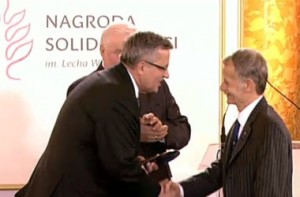
New Ukrainian President Petro Poroshenko, US secretary of State Kerry, Swedish minister of Foreign Affairs Bildt, former Polish President Lech Walesa took part at the ceremony.
Mustafa Dzhemilev was banned from entering Russian territory, including the recently annexed Crimea, after he condemned the March referendum.
On Monday evening Dzhemilev told Polish public television station TVP that the Crimean Tatars would continue to fight for their rights.
“We are not going to wage war against Russia, We have not shed anyone’s blood, We will fight for our rights with peaceful means.” he said.
Dzhemilev, like the vast majority of Crimean Tatars, was deported from his homeland in 1944, and he grew up in Uzbekistan, where he was involved in dissident activities. He returned to Crimea in 1989.
“For years, Mustafa Dzhemilev has been promoting democracy and civil rights and civil liberties in Ukraine, specifically among the Tatar community,” Foreign Minister Radoslaw Sikorski said.
“The people of Ukraine made a very good choice, I have known Petro Poroshenko for many years,” said Dzhemilev of the presidential elections of 25 May.
“He is a patriot, an honest man, even though a businessman. It is very important for me that he said that the most important matter is to free Crimea from the occupation. Without being released from the occupation, we cannot imagine how we will be able to live on,” he added.
From Polskie Radio, TVP
Mustafa Dzhemilev’s battle for Crimea – Deutsche Welle
Poland buried General Jaruzelski.
30 May 2014A eulogy to the life of Wojciech Jaruzelski was given by former Polish President (1995-2005) Aleksander Kwasniewski. He said about imposing martial law crackdown against the Solidarity movement in 1981 that “with sincere conviction at a moment of severe crisis the lesser of two evils: protecting us from either foreign intervention or a fraternal civil war”.
Lech Walesa, former chief of Solidarity Trade Union and then Polish president, took part at the ceremony and gave his condolences to the General’s family.
Jaruzelski, who died aged 90 on May 25th, rests in peace in Warsaw’s Pawazki Military Cemetery, the place of burial of many notable Poles.
Material from Polskie Radio and PAP
The EU Vote – 2014
28 May 2014| Political Group | Votes | MEPs | ||
| Political Group | % | Change+/- | Total | Change +/- |
| Epp | 24.22 | -8.29 | 221 | -50 |
| Soc | 24.26 | +1.58 | 185 | -6 |
| Oth | 20.91 | +7.38 | 113 | +84 |
| Lib | 7.87 | -2.42 | 55 | -30 |
| Grn | 7.21 | -0.04 | 47 | -8 |
| Con | 4.16 | -0.59 | 45 | -11 |
| Left | 6.23 | +2.1 | 45 | +10 |
| Efd | 5.13 | 0.29 | 40 | +11 |
Dalia Grybauskaite was re-elected president of Lithuania in a runoff. She won 58% of the votes with her Social Democrat rival Zigmantas Balcytis trailing on 42%. Early results showed about 43.7 percent of the country’s 2.5 million registered voters went to the polls. Lithuanians also voted to fill 11 seats in the European Parliament.
Ms Grybauskaite thanked her supporters for granting her a second term.
“No president has been elected twice in a row in Lithuania. It will be a historic victory for all of you,” she said.
She is an economist who served as Lithuania’s finance minister and EU budget commissioner before becoming her country’s first female president in 2009.
Russia-China gas deal at last
21 May 2014China and Russia signed a widely anticipated 30-year natural gas agreement in Shanghai. This agreement will diversify both sides’ energy consumption and supply structures
The 30-year gas supply deal, worked out in Shanghai between China National Petroleum Corp (CNPC) and Russia’s state-controlled entities Gazprom, ended a decade of negotiation between the two countries. 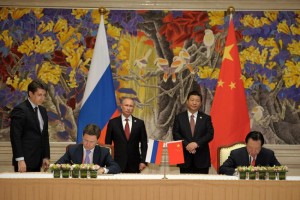
CNPC said in a statement that the imported natural gas will mainly supply regions around Beijing, cities in northeast China as well as the Yangtze River Delta.
According to the agreement, the east route pipeline will start providing China with 38 billion cubic meters of natural gas annually from 2018.
The price details have not been disclosed but earlier media reports projected the contract price could be $400 billion. It means that the final price is around 350 US dollars per thousand cubic meters.
Both countries get advantages: China will have more leverage when it negotiates with the other natural gas exporters in the future. And Russia obtains a huge, new market outside Europe.
One key point was who should pay to build the pipelines. If China can pay in advance for the imported gas, Russia will use the money to build the pipeline.
The gas from Russia accounts for only a small part of China’s overall energy consumption. Developed countries remain major trade partners for China.
China needs the gas to help it cut its coal-fired smog levels, and it wants to diversify supply. It had the luxury of time in which to negotiate, something Mr Putin was short of.
The perceived motive for the deal is that Russia needs a second market for its gas, so it can face up to European sanctions. Given that the “Power of Siberia” pipeline won’t start pumping gas into Chinese factories until 2018 at the earliest, its economic effect on the European crisis will be limited.
It was the biggest expansion in EU history when ten countries joined the bloc ten years ago amid great expectations and joy. Entrepreneurs in the old EU states were the only ones who remained wary. 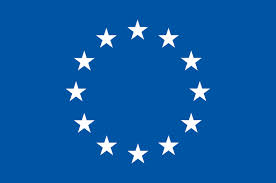
Niklas Helvig Research Fellow – The European Union Research Programme, Finnish institute of International Affaire thinks that after the end of the cold war, it was the only feasible policy of the EU to offer the countries in Europe’s East a European perspective. First and foremost, the new countries benefited greatly from accession. Just one example: while the GDP per capita in Slovakia was on the same level as Ukraine in 1990, it is now 4 times as high. Most of the increase took place from the early 2000s onwards. But also the EU itself benefited from its new members. Many of the new member states play a leading role in the policy making of the Union. Poland, for example, is a major player in Europe’s foreign policy.
Frank Hage Lecturer in Politics, Department of Politics and Public Administration, University of Limerick thinks that the prospect of becoming an EU member state was an important incentive in developing and maintaining democratic standards and functioning market economies for the countries transitioning from communist rule. In this regard, the prospect of enlargement and then the integration in the EU was very much a stabilizing factor in Central and Eastern Europe. That a trajectory towards democracy and the rule of law of transitioning countries cannot be taken for granted is best illustrated by current developments in Northern Africa after the Arab Spring revolutions and developments at the current EU’s Eastern periphery (e.g. Belarus and Ukraine).
According to Marjan Svetlicic Professor of International Economic Relations and Negotiations, University of Ljubljana Crises revealed some problems in the functioning of the EU as a whole which were accentuated by differences in the development level between old and new members. It revealed that the convergence was not fast enough that differences during the crises increased, that new members lagged behind in competitiveness that reforms in many of them slowed down after first positive effects of enlargement were consumed. Perhaps the major problem was that incumbent members, particularly Germany, thought that after enlargement adjustments are necessary only in new members. However “one needs two to dance”. Hence old members have to adjust as well. It is not sustainable that some countries, particularly Germany remains for years net exporter to other members and new members net importers.
Tom Rostoks, Researcher, Latvian Institute of International Affairs, In my opinion, the EU enlargement has been a tremendous success because it has shown what can be achieved by determined reform-minded governments in Central and Eastern Europe. Both old and new member states have benefited from enlargement. New member states have benefited financially from increased EU funding and their citizens have enjoyed greater freedom of movement. But old member states have also benefited because of increased stability and prosperity on their doorsteps. EU enlargement was a historical possibility, a window of opportunity, and the current events in Ukraine bear witness of what is happening with countries that do not formally belong to the community of EU and NATO member states.
From Matisak blog
See also:
Pope Francis has declared Popes John Paul II and John XXIII saints, in front of a crowd of hundreds of thousands.
He praised his two predecessors as “men of courage” at the Vatican service, the first time in history that two popes have been canonised at the same time.
The Mass was attended by about 100 foreign delegations.
The Catholic Church’s two newest saints were “popes of the twentieth century” and “were not afraid to look upon the wounds of Christ,” said Pope Francis on Sunday.
“They lived through the tragic events of that century, but they were not overwhelmed by them,” Pope Francis said in his homily. “For them, God was more powerful; faith was more powerful — faith in Jesus Christ the Redeemer of man and the Lord of history.” 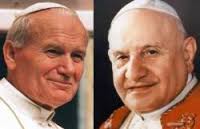
Earlier in the Mass, also attended by Pope Emeritus Benedict XVI, Pope Francis read the formal proclamation of sainthood during the canonization rite. The crowd roared with applause upon hearing their names read in Latin in the official proclamation.
Pope Francis described Saint John XXIII as “the pope of openness to the Spirit” and Saint John Paul II as “the pope of the family“, each description followed by applause.
Pope Francis also underlined the deep faith of his two predecessors: “These were two men of courage, filled with the parrhesia of the Holy Spirit, and they bore witness before the Church and the world to God’s goodness and mercy.”
The two new saints “teach us to enter ever more deeply into the mystery of divine mercy,” he concluded.
Analysts say Francis is trying to balance the conservative legacy of John Paul with the reforming zeal of John.
Source: Vatican Radio
OSCE, in Slavyansk not monitors, but Military verification team sent from OSCE countries.
26 Apr 20141/4 Comms with military observers in Donetsk region lost.Team not OSCE monitors but sent by States under Vienna Doc on military transparency
7:35 PM – 25 Apr 2014
2/4 All members of the OSCE Special Monitoring Mission and OSCE/ODIHR election observers are safe and accounted for
7:36 PM – 25 Apr 2014
3/4 Military verification team – led by Germans – and composed of 8 members – 4 Germans, 1 Czech, 1 Danish, 1 Polish, 1 Swedish
7:36 PM – 25 Apr 2014
4/4 Military verification team sent following invitation from Ukraine under terms of Vienna Document 2011
7:37 PM – 25 Apr 2014
Source: OSCE.org
—
The Vienna Document is an agreement between the participating states of the Organization for Security and Co-operation in Europe implementing confidence and security building measures. 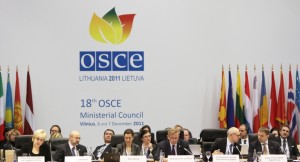
Its provisions include an annual exchange of military information about forces located in Europe (defined as the Atlantic to the Urals), notifications for risk reduction including consultation about unusual military activities and hazardous incidents, prior notification of certain military activities, observation of certain military activities, exchange of annual calendars, and compliance and verification by inspection and evaluation visits.
This exchange differs from the Global Exchange of Military Information in that it is limited to forces in Europe, while the Global Exchange of Military Information applies to all forces of the participating states, wherever located.
The annual exchange of information is conducted concurrently with the annual exchange of information under the Conventional Forces in Europe treaty, in Vienna, Austria in December of each year. The Vienna Document has been revised periodically, and the current version is the 2011 version.
From Wikipedia
—
Overview of Vienna Document 2011
Vienna Document 2011 (VD11) is composed of politically binding confidence and security-building measures (CSBMs) designed to increase openness and transparency concerning military activities conducted inside the OSCE’s zone of application (ZOA), which includes the territory, surrounding sea areas, and air space of all European (Russia from the western border to the Ural Mountains) and Central Asian participating States. A variety of information exchanges, on-site inspections, evaluation visits, observation visits, and other military-to-military contacts take place according to VD11 provisions. In the case of the United States (and Canada), only military forces and activities inside the ZOA are impacted.
VD11 builds on previous agreements: the 1975 Helsinki Final Act, the Document of the Stockholm Conference of 1986, the 1992 Helsinki Document, and the Vienna Documents of 1990, 1992, 1994, and 1999. It is part of an interlocking web of mutually enforcing agreements, including the Treaties on Conventional Arms Control in Europe (CFE) and Open Skies, which form the current European conventional arms control framework.
The EU must create an energy union to secure its gas supply because the current dependence on Russian energy makes Europe weak, Poland’s prime minister, Donald Tusk, wrote in an article in the Financial Times.
Russia, which provides around one third of the EU’s oil and gas, sent shockwaves through the international community with its military intervention and annexation of Ukraine’s Crimea peninsula in March. 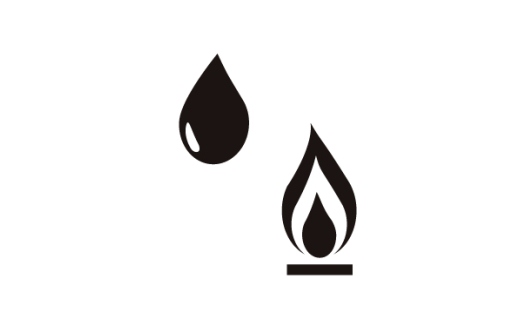
Tusk noted that the EU was creating a banking union, with a single supervisor, and a single resolution mechanism and fund to close down failing institutions.
The EU was also already jointly buying uranium for its nuclear power plants. The approach to Russian gas should be the same,.
“I therefore propose an energy union. It will return the European Community to its roots,” EU precursor the European Coal and Steel Community was formed in 1952.
Such a union should be based on several elements, he explained.
The first of these would be the creation of a single European body that would buy gas for the whole 28-nation bloc. Another would be that if one or more EU countries were threatened with being cut off from gas supplies, the others would help through “solidarity mechanisms“.
The EU must also help finance gas storage capacity and gas links in the countries most dependent on gas sold by the state-owned Russian gas monopoly Gazprom. The energy union would also seek agreements to buy gas from exporters outside Europe, such as the United States or Australia. It could be transported to Europe by ship in liquefied form.
“Today, at least 10 EU member states depend on a single supplier – Gazprom – for more than half of their consumption. Some are wholly dependent on Russia’s state-controlled gas giant,” Tusk said.
Another element was the full use of the EU’s existing fossil fuels, including coal and shale gas.
“In the EU’s eastern states, Poland among them, coal is synonymous with energy security. No nation should be forced to extract minerals but none should be prevented from doing so – as long as it is done in a sustainable way,” Tusk said.
Finally the EU should strengthen the existing Energy Community of the EU and eight of its eastern neighbours, created in 2005 to extend the European gas market eastward.
Welcome
We are a group of long experienced European journalists and intellectuals interested in international politics and culture. We would like to exchange our opinion on new Europe and Russia.
Categories
- Breaking News (11)
- CIS (129)
- Climate (2)
- Energy&Economy (115)
- EU Eastern Dimension (85)
- Euro 2012 – Sochi 2014 – World Cup 2018, Sport (43)
- Euro-Integration (135)
- History Culture (198)
- International Policy (261)
- Military (74)
- Interviews (18)
- Italy – Italia – Suisse (47)
- Odd Enough (10)
- Poland and Baltic States (126)
- Religion (31)
- Russia (421)
- Survey (4)
- Turning points (4)
- Ukraine (176)
- Российские страницы (113)
Archives
- November 2020
- October 2020
- September 2020
- August 2020
- July 2020
- May 2020
- April 2020
- March 2020
- January 2020
- December 2019
- November 2019
- October 2019
- September 2019
- August 2019
- July 2019
- June 2019
- May 2019
- April 2019
- March 2019
- February 2019
- December 2018
- November 2018
- October 2018
- September 2018
- August 2018
- July 2018
- June 2018
- May 2018
- April 2018
- March 2018
- February 2018
- January 2018
- December 2017
- November 2017
- October 2017
- September 2017
- August 2017
- July 2017
- May 2017
- March 2017
- January 2017
- December 2016
- November 2016
- October 2016
- September 2016
- July 2016
- June 2016
- May 2016
- April 2016
- February 2016
- January 2016
- November 2015
- October 2015
- September 2015
- June 2015
- April 2015
- March 2015
- February 2015
- January 2015
- December 2014
- November 2014
- October 2014
- September 2014
- August 2014
- July 2014
- June 2014
- May 2014
- April 2014
- March 2014
- February 2014
- January 2014
- December 2013
- November 2013
- October 2013
- September 2013
- August 2013
- July 2013
- June 2013
- May 2013
- April 2013
- March 2013
- February 2013
- January 2013
- December 2012
- November 2012
- October 2012
- September 2012
- August 2012
- July 2012
- June 2012
- May 2012
- April 2012
- March 2012
- February 2012
- January 2012
- December 2011
- November 2011
- October 2011
- September 2011
- August 2011
- July 2011
- June 2011
- May 2011
- April 2011
- March 2011
- February 2011
- January 2011
- December 2010
- November 2010
- October 2010
- September 2010
- August 2010
- July 2010
- June 2010
- May 2010
- April 2010
- March 2010
- February 2010
- January 2010
- December 2009
- November 2009
- October 2009
- September 2009
- August 2009
Our books




